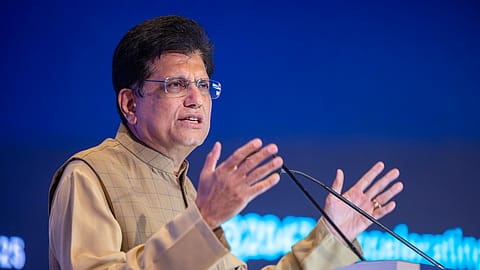Massive opportunity awaits India in the medical tourism sector: Piyush Goyal
During the CII Health Summit, Goyal also addressed the recent Red Fort tragedy, stressing the importance of security. Goyal also highlighted the government's efforts to increase medical seats and improve healthcare access for senior citizens.

Union Commerce Minister Piyush Goyal, during his keynote address at the 22nd CII Annual Health Summit in New Delhi today, said India faces a shortage of nurses and caregivers, even as the country stands on the brink of a massive opportunity in the medical tourism sector. "We have countries where medical treatment is given as a part of the social welfare spending, but there are huge waiting times," he noted.
The minister expressed hope that the health summit would come up with a concrete action plan to strengthen the healthcare ecosystem, particularly in terms of infrastructure and capacity building.
The Union minister also referred to Monday's tragic blast at the Red Fort, which claimed at least 10 lives and left many injured. Calling it " tragic", the Union minister said it's a reminder that citizens must remain vigilant about safety and security. "Many of our brothers and sisters are injured. We all have to be very cautious about the safety and security of our environments...very careful about terrorism rearing its head again.”
Here are the key points made by the Union minister in this speech:
1. Goyal said even yesterday, in New Delhi, it was the doctors who gave immediate emergency care at the Lok Naik Jai Prakash Narayan Hospital, where the injured (of the Red Fort blast) were shifted. "This kind of first responder critical care service that you give is something that the nation and all of us are very, very proud of."
2. The minister said when the Modi government came to power in 2014, there were only seven All India Institutes of Medical Sciences (AIIMS). In the last decade, this has risen to 23. "At the same time, 387 medical colleges almost doubled to 706 medical colleges."
3. Citing Prime Minister Narendra Modi, Goyal said that India will be creating a very significant number of medical seats in the next five years until 2029, so the output of doctors, who come out of medical colleges, can increase significantly, and the medical infrastructure can be utilised smarter and better.
Recommended Stories
4. The minister said in India, every senior citizen above the age of 70 is eligible for free health care, irrespective of income. Citing the PM, he said everybody above 70 should have this social security net or the comfort that he or she will be taken care of, because many elders today are neglected even in affluent homes.
5. Goyal, however, said India must focus on making healthcare accessible for local people as well, and that India's health facilities should not only focus on an international medical value proposition. "It’s important that 1.4 billion Indians get access to affordable and quality healthcare first.”
6. He also mentioned the idea of a visa on arrival, saying India may pursue that. "Of course, one will have to look at what the certifications will be, and which countries we can allow that in. Many countries already have e-visas, where you just apply online and get your visa within 48 hours.”
7. Goyal also urged healthcare players to have the administrators or the trustees sit down and work out how India can increase the nurses' output by maybe 100,000 nurses a year. "Because that's the level of demand in the world for our nurses, and we already have a shortage of nurses and caregivers.”
(INR CR)
8. He said hospitals also must strike the right balance between foreign patients and local patients. On the question of whether hospitals could be allowed up to 10% of foreign patients, Goyal asked if hospitals, in return, would provide benefits to the poor. "Will hospitals approve or agree to be a part of the Ayushman Bharat? Or give to the poor as a part of CSR, or will they share a part of the higher earnings from foreign medical treatments to serve the less privileged? And then I can assure a treatment here will be done at one-fourth or one-third the price that's required anywhere else in the world."